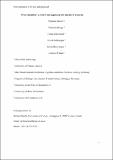Files in this item
‘Over-imitation’ : a review and appraisal of a decade of research
Item metadata
| dc.contributor.author | Hoehl, Stephanie | |
| dc.contributor.author | Keupp, Stefanie | |
| dc.contributor.author | Schleihauf, Hanna | |
| dc.contributor.author | McGuigan, Nicola | |
| dc.contributor.author | Buttelmann, David | |
| dc.contributor.author | Whiten, Andrew | |
| dc.date.accessioned | 2021-01-03T00:38:48Z | |
| dc.date.available | 2021-01-03T00:38:48Z | |
| dc.date.issued | 2019-03 | |
| dc.identifier | 256979910 | |
| dc.identifier | dd453a8e-c077-4505-b8f3-392099f45368 | |
| dc.identifier | 85059351517 | |
| dc.identifier | 000459951300005 | |
| dc.identifier.citation | Hoehl , S , Keupp , S , Schleihauf , H , McGuigan , N , Buttelmann , D & Whiten , A 2019 , ' ‘Over-imitation’ : a review and appraisal of a decade of research ' , Developmental Review , vol. 51 , pp. 90-108 . https://doi.org/10.1016/j.dr.2018.12.002 | en |
| dc.identifier.issn | 0273-2297 | |
| dc.identifier.uri | https://hdl.handle.net/10023/21213 | |
| dc.description | This work was supported by the Deutsche Forschungsgemeinschaft (DFG) [grant number HO 4342/8-1]. | en |
| dc.description.abstract | After seeing an action sequence children and adults tend to copy causally relevant and, more strikingly, even perceivably unnecessary actions in relation to the given goal. This phenomenon, termed “over-imitation”, has inspired much empirical research in the past decade as well as lively theoretical debate on its cognitive underpinnings and putative role in the transmission of cultural knowledge. Here, we offer a comprehensive review of the existing literature to date, accompanied by a table including concise information on 54 published studies testing over-imitation in different species, age groups and cultures. We highlight methodological issues related to task and context that influence over-imitation rates and that should be carefully considered in study designs. We discuss the cognitive and motivational processes underlying and contributing to over-imitation, including normative action parsing, causal reasoning, motives of affiliation and social learning as well as their complex interplay. We conclude that despite the apparent irrationality of over-imitation behavior, recent studies have shown that its performance depends on the specific task, modeled actions and context variables, suggesting that over-imitation should be conceptualized as a contextually flexible and, in fact, a normally highly functional phenomenon. | |
| dc.format.extent | 1587523 | |
| dc.language.iso | eng | |
| dc.relation.ispartof | Developmental Review | en |
| dc.subject | Imitation | en |
| dc.subject | Over-imitation | en |
| dc.subject | Cultural learning | en |
| dc.subject | Social norms | en |
| dc.subject | Social learning | en |
| dc.subject | BF Psychology | en |
| dc.subject | T-NDAS | en |
| dc.subject.lcc | BF | en |
| dc.title | ‘Over-imitation’ : a review and appraisal of a decade of research | en |
| dc.type | Journal item | en |
| dc.contributor.institution | University of St Andrews. School of Psychology and Neuroscience | en |
| dc.identifier.doi | 10.1016/j.dr.2018.12.002 | |
| dc.description.status | Peer reviewed | en |
| dc.date.embargoedUntil | 2021-01-03 |
This item appears in the following Collection(s)
Items in the St Andrews Research Repository are protected by copyright, with all rights reserved, unless otherwise indicated.

